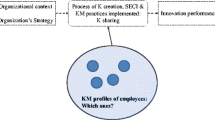Abstract
The management of knowledge demonstrates a substantial amount of literature focused at organisational level with the management of people and the development of their skills and knowledge often determining success or failure. However, with increased pace and the use of more informal approaches in workplace communication through modern technologies, success is often determined by the individual knowledge management (KM) of the employees themselves indirectly providing organisational benefits. This article proposes a model for this personal KM, relating traditional organisational KM theory to individual knowledge acquisition and management processes. The influences of peer and hierarchical communities to the personal KM process are also discussed.




Similar content being viewed by others
Notes
Webpage information available at nbs.newport.ac.uk/displayPage.aspx?object_id=8421&parent_id=2860&type=PAG.
Hamilton-Jones, J.K.=Smedley, J.K.
References
Boud, D.J. (1995) Experience as the base of learning. Higher Education Research and Development 12: 34–44.
Brown, J.S. and Duguid, P. (1991) Organisational learning and communities of practice: Towards a unified view of working, learning and innovation. Organization Science 2 (1): 41–57.
Condon, W.S. (1976) An analysis of behavioural organisations. Sign Language Studies 13: 285–318.
Davenport, T.H. and Prusak, L. (1997) Working knowledge: How Organisations Manage What They Know. Cambridge, MA: Harvard Business Press, p. 5.
Easterby-Smith, M. (1999) Organisational debates and opportunities. In: M. Easterby-Smith, L. Araujo and J. Burgoyne (eds.) Organisational Learning and the Learning Organization: Developments in Theory and Practice, pp. 1–23.
Edwards, J.S. and Kidd, J.B. (2003) Knowledge management sans frontieres. Journal of the Operational Research Society 54: 130–139.
Gebert, H., Geib, M., Kolbe, L. and Riempp, G. (2002) Towards customer knowledge management: Integrating customer relationship management and knowledge management concepts. Second International Conference on Electronic Business; December 2002, Taipei, Taiwan.
Guile, D. and Griffiths, T. (2001) Learning through work experience. Journal of Education and Work 14 (1): 113–131.
Hamilton-Jones, J.K. (2000) Supporting tomorrow's managers – Coca Cola in-house degree programme. Education and Training, 42: 461–468.
Hardin, R. (1992) The street-level epistemology of trust. Analogy of Krit 14: 152–176.
Kim, D.H. (2004) The link between individual and organizational learning. In: K. Starkey, S. Tempest and A. McKinley (eds.) How Organizations Learn: Managing the Search for Knowledge, 2nd edn. London, UK: Thomson, pp. 29–50.
Kolb, D.A. (1984) Experiential Learning: Experience as the Source of Learning and Development. New Jersey: Prentice-Hall, (0 13 295261 0).
Lander, D., Walta, A., McCorriston, M. and Birchall, G. (1995) A practical way of structuring teaching for learning. Higher Education Research and Development 14: 47–59.
Lave, J. and Wenger, E. (1991) Situated Learning: Legitimate Peripheral Participation. Cambridge: Cambridge University Press.
March, J.G. and Olsen, J.P. (1989) Rediscovering Institutions: The Organizational Basis of Politics. New York: Free Press.
Mayer, R.C., Davis, J.H. and Schoorman, F.D. (1995) An integrative model of organisational trust. Academy of Management Review 20 (3): 709–734.
Nielsen, A.P. (2006) Understanding dynamic capabilities through knowledge management. Journal of Knowledge Management 10 (4): 59–71.
Nonaka, I. and Konno, N. (1998) The Concept of ‘Ba’: Building a foundation for knowledge creation. California Management Review 40 (3): 40–54.
Schon, D. (1987) Educating the Reflective Practitioner: Towards a New Design for Teaching and Learning. San Francisco: Jossey-Bass.
Senge, P.M. (1990) The Fifth Discipline. New York: Doubleday/Currency.
Shariq, S.Z. (1997) Knowledge management: An emerging discipline. Journal of Knowledge Management 1 (1): 75–82.
Skyrme, D. (1999) Knowledge Networking: Creating the Collaborative Enterprise. Boston, MA: Butterworth Heinemann.
Tissen, R., Andriessen, D. and Deprez, F. (1998) Value-based Knowledge Management: Creating the 21st Century Company: Knowledge Intensive, People Rich. Amsterdam, The Netherlands: Addison-Wesley, Longman.
Truch, E. (2001) Managing personal knowledge: The key to tomorrow's employability. Journal of Change Management 2 (2): 102–105.
Wang, C.L. and Ahmed, P.K. (2003) Structure and structural dimensions for knowledge-based organizations. Measuring Business Excellence 7 (1): 51–62.
Wenger, E. (1998) Communities of Practice: Learning, Meaning and Identity. New York, NY, Cambridge University Press, pp. 72–84.
Wenger, E. and Snyder, W. (2000) Communities of practice: The organisational frontier. Harvard Business Review 78 (1): 139–145.
Wright, K. (2005) Personal knowledge management: Supporting individual knowledge worker performance. Knowledge Management, Research and Practice 3: 156–165.
Vince, R. (1998) Behind and beyond Kolb's learning cycle. Journal of Management Education 22 (3): 304–319.
Author information
Authors and Affiliations
Rights and permissions
About this article
Cite this article
Smedley, J. Modelling personal knowledge management. OR Insight 22, 221–233 (2009). https://doi.org/10.1057/ori.2009.11
Published:
Issue Date:
DOI: https://doi.org/10.1057/ori.2009.11




